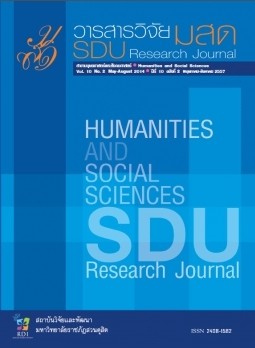คุณลักษณะความเป็นมืออาชีพของผู้บริหารสถานศึกษากับการจัดการศึกษาในศตวรรษที่ 21
Keywords:
Professional Characteristics, School Administrators, Education Managements in the Twenty-First CenturyAbstract
The purposes of this research were to 1) study levels of professional characteristics of school administrators, 2) study levels of education managements in the 21st century, and3) to study correlation between professional characteristics of school administrators and
education managements in the 21st century. The purposive sampling was used to involve 125 administrators of schools that joined teaching professional internship project of the
fifth-year students, Faculty of Education, Suan Sunandha Rajabhat University as the participants of the study. The instrument was a questionnaire concerning professional characteristics
of school administrators and education managements in the twenty-first century. The
questionnaire was a five-scale evaluating form.The statistics used in this research were
frequency, percentage, mean, standard deviation, and Pearson correlation coefficient. The findings were as follows. Professional characteristics of school administrators. Administrators of schools that joined teaching professional internship project of the fifth-year students,
Faculty of Education, Suan Sunandha Rajabhat University as the participants of the study were rated the “highest” level for professional characteristics of school administrators. Education managements In twenty-first century. The school of education managements in twenty-first century were found at “high” overall level. The relationship of professional characteristics of school administrators and education managements in twenty-first century. Professional
characteristics of school administrators and education managements in the twenty-first
century relationship at the .01 significantly statistical level were found at “high” level for instructional management. The relationship education support systems and student outcomes were found at “average” level at the .01 significantly statistical level.
References
วรพจน ์วงศก์จิรงุ่เรอืง และอธปิ จติตฤกษ.์ (ผแู้ปล). (2554). 21st Century Skills: Rethinking How Student Learn. กรุงเทพฯ: ส�านักพิมพ์ open worlds. สถาบันทดสอบทางการศึกษาแห่งชาติ. (2560). เผยโอเน็ต ม.3 คะแนนเฉลี่ยทั่วประเทศตำ่ากว่า 50 ทุกวิชา. สืบค้น 21 กรกฎาคม 2560, จาก https://www.matichon.co.th/news/507624. สภาปฏิรูปแห่งชาติ.(2558). วาระปฏิรูปที่ 16 การปฏิรูประบบการจัดการศึกษา วาระปฏิรูปที่ 17 การปฏิรูป การคลังด้านการศึกษา (ด้านอุปสงค์) วาระปฏิรูปที่ 18 การปฏิรูประบบการเรียนรู้. กรุงเทพฯ: ส�านักงานเลขาธิการสภาผู้แทนราษฎร. ส�านกังานเลขาธกิารสภาการศกึษา. (2556). บทวเิคราะหส์ถานภาพการพฒันาครทูงั้ระบบและขอ้เสนอแนะแนว ทางการพัฒนาครูเพื่อคุณภาพผู้เรียน. กรุงเทพฯ: พริกหวานกราฟฟิค จ�ากัด. ส�านักงานเลขาธิการสภาการศึกษา. (2557). รูปแบบการบริหารจัดการสถานศึกษาขั้นพื้นฐาน. กรุงเทพฯ:
พริกหวานกราฟฟิค จ�ากัด. ส�านักงานคณะกรรมการพัฒนาการเศรษฐกิจและสังคมแห่งชาติ. (2558). เอกสารประกอบการประชุม ประจำาปี 2558 ทิศทางแผนพัฒนาเศรษฐกิจและสังคมแห่งชาติ ฉบับที่ 12 (พ.ศ. 2560-2564). มปท. ส�านักงานเลขาธิการคุรุสภา. (2558). มาตรฐานวิชาชีพและจรรยาบรรณของวิชาชีพ. กรุงเทพฯ: พี.เอ. ลีฟวิ่ง จ�ากัด. Translated Thai References Dechacoop, P. (2006). Teaching Thinking with Science Projects. Bangkok: Chulalongkorn University. Ministry of Education. (2003). National Education Act B.E. 2542 and Revision (Vol.2) B.E. 2545. Bangkok: The Teacher Council of Thailand Organization, s printing house. National Reform Council. (2015). form agenda 16 Reform of education management system Reform 17 Reform of education (demand side) Reform agenda 18 Reform of
learning system. Bangkok: Office of Printing Office of the Secretary of the House of Representatives. Office of the National Economic and Social Development Board. (2015). Document for the Annual Meeting of the National Economic and Social Development Plan No.12 (1960-2021). MCD. Phatarawas, K., Tangkitvanich, S., & others. (2013). “Free Responsible” key to good school with efficiency. N.p.Prayudsup, P. (2014). The role of professional school administrators in influencing the
development of learner characteristics in international standard schools under
the office of Educational Service Area 4, Pathum Thani Province. (Master’s thesis). Rajamangala University of Technology Thunyaburi, Bangkok. (in Thai) Secretariat Office of the Teachers, Council of Thailand. (2015). Professional Standards and Ethics. Bangkok: P.A. Living Co., Ltd. Sinlarat, P. (2014). Thai Teacher Training in the 21st Century “The Apostolate of learning … Towards the Thai Future” (6-8 May, 2014). The Council of Education. (2013). Teacher Development Guideline for the Quality of Students. Bangkok: Prigwaan Graphic Co., Ltd. The Council of Education. (2014). Basic school management model. Bangkok: Prigwaan
Graphic Co., Ltd. The National Institute of Educational Testing Service. (2017). O-net M. 3 points average
nationwide below 50 all subjects. [21 July] https://www.matichon.co.th/news/507624. Vonggitrungrueing, V., Jitphuog, A. (Translators). (2011). 21st Century Skills: Rethinking How Student Learn. Bangkok: Publisher open worlds.








